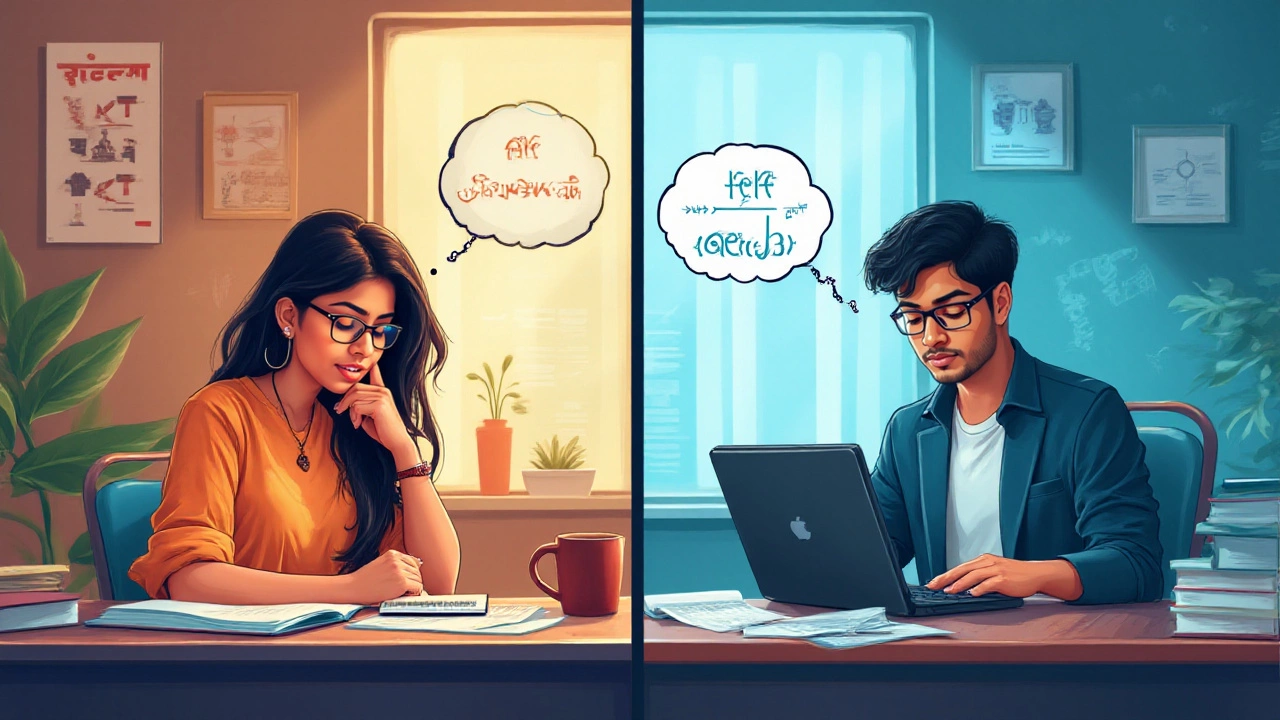Try picturing two friends prepping after work: one chipping away at logic games for the LSAT, the other buried under medical textbooks for the MCAT. Both look exhausted. The question always comes up—Which exam is harder? It’s not just curiosity. The answer can totally shape your study strategy (and your sanity). So if you’re weighing a future in law or medicine, you want to know what you’re up against. Here’s the truth: both tests are tough, but in totally different ways. Let’s break down where each exam pushes you the hardest and what that means if you’re making a decision.
The Basics: How the LSAT and MCAT are Built
The Law School Admission Test (LSAT) and the Medical College Admission Test (MCAT) might sound like cousins, but they come from different families. The MCAT is all about science: biology, chemistry, physics, even a section on psychology and sociology. It also has a passage-based "Critical Analysis and Reasoning Skills" section, or CARS, that feels like a tricky cousin to the LSAT’s reading comprehension. But that’s pretty much where the similarities stop.
The LSAT measures how you think—not how much you know. It’s famous (or infamous) for logic games, logical reasoning, and reading comprehension alone. No prior knowledge is required for the LSAT; the points come from how sharply your brain slices through arguments or puzzles. The MCAT? If you don’t know your mitosis from your meiosis, you’ll be in trouble. MCAT test-takers need to memorize volumes, then apply that info to high-pressure, passage-based questions.
The MCAT is much longer than the LSAT. A standard MCAT runs 7 hours, while the LSAT clocks in around 3 hours. That alone scares some people off. Still, for others, the prospect of wrestling with abstract logic games triggers more anxiety than a long test marathon.
| Test | Length | Sections | Main Skills Tested | Knowledge Required |
|---|---|---|---|---|
| LSAT | ~3 hours | Logical Reasoning, Logic Games, Reading Comprehension, Writing Sample | Critical Thinking, Analytical Reasoning | None (skills-based) |
| MCAT | ~7 hours | Chem/Phys, CARS, Bio/Biochem, Psych/Soc | Science Content Application, Reasoning | High (heavy science background required) |
Both exams are multiple-choice, but the LSAT’s logic games section is unique—no other major standardized test uses this kind of puzzle. If your brain thrives on structure and patterns, you might find these even fun (confession: I always liked sudoku, which helped). If not, they might feel like a wall you keep running into.
Measuring the Difficulty: Content, Skills, and Endurance
When people ask which test is harder, they usually mean something like: Which one would more students struggle with if both had to take them? Thing is, law aspirants and med hopefuls usually have very different backgrounds.
The MCAT’s biggest hurdle is the volume and depth of content. Medical aspirants start prepping as soon as classes start—sometimes years in advance. You need to know about enzymes, DNA, statistics, brain chemistry, social behavior, and more. Before even sitting for the MCAT, candidates often put in over 300-400 hours of prep (sometimes way more). There are reports of students feeling like they’re prepping for a mini-medical school before even getting to campus. And the pass rate? According to the AAMC, in the 2024 admissions cycle, the average MCAT score for successful US med school entrants was around 511 out of 528 (roughly the 80th percentile). That’s a steep curve—a ton of strong candidates fighting for every point.
Now, let’s talk LSAT. The content isn’t rocket science—it’s all right there in front of you. No equations, no diagrams of the heart. But the questions? They’re often described as "mind-bending." The LSAT expects you to solve dense puzzles at high speed, with little room for error. It tests skills not always taught in college: how to spot a logical fallacy, untangle a tricky sequence, or spot the one sentence that doesn’t match the author’s argument. Scores range from 120 to 180, but the average score for those accepted to top U.S. law schools was 172 or higher in 2024, according to the LSAC. Only 1-2% of test-takers hit these numbers. Even with weeks of steady practice, some people just can’t crack the logic games, while others hit a "wall" in reading comp speed.
Endurance is another beast. The MCAT’s 7-hour slog can wipe out even strong minds. Students train for it by taking full-length practice tests—starting with 2-hour blocks, then working up. I’ve heard countless stories of friends feeling drained after four hours, only to realize they weren’t even halfway done. Snack breaks can become an oddly crucial performance factor. The LSAT isn’t as long, but mental fatigue sets in because you’re making dozens of small, high-stakes decisions under time pressure — no zoning out is allowed.

Test Prep, Success Rates, and What Surprises Students Most
Let’s talk preparation. The MCAT practically demands a science-heavy schedule in high school and college, not just during prep season. Many students lean on coaching centers or YouTube giants—crash courses, long hours, more flashcards than fit on my kitchen table. The LSAT isn’t immune to this either: most serious candidates buy prep books, enroll in online bootcamps, or join peer study groups. But you can probably get away with self-study for the LSAT if your logical brain is already well-trained, while the MCAT almost always demands external support for the science content.
Here’s something that shocks a lot of people: your background matters way more than you think. If you did well in science, you might find the MCAT content familiar and comforting—even if there’s a ton of it. If you’ve always been the person who can untangle complex arguments in a debate, the LSAT might feel less like work and more like a game. The reason it’s so hard to declare a "winner" between the two is that each exam throws different types of curveballs.
A few pro tips I share every time:
- For the MCAT: Get super comfortable with timed practice tests, break down complex processes into diagrams, and never neglect non-science sections. The CARS section catches out even strong science students. Try reading The Economist or dense passages from unfamiliar subjects to get better here.
- For the LSAT: Spend extra time on logic games early on—the improvement curve is real, but you have to hit it hard at first. Use blind review (redoing questions after time is up) and talk out explanations with friends or coaches—you may surprise yourself with what you missed.
- For both: Plan breaks during study sessions. Our brains only have so much focus juice; my husband Rohan jokes that my brain can run on coffee and adrenaline for about 90 minutes before crashing. Don’t ignore those signals.
Look at success stories: candidates for both tests often go for two or even three rounds before nailing their target scores. According to LSAC, around 25% of test-takers retake the LSAT at least once. Repeat MCAT attempts are also common—as per the AAMC, about 23% of students take it more than once. It’s rarely about "being smart enough," and more about whether you can build up the right kind of mental muscle. Surprises? The number of students who ace practice tests only to freeze on test day. Simulating pressure is key: test in loud environments, use unfamiliar rooms, and mess with your routine so you’re ready for anything.
So, Which Exam Is Harder? The Final Scorecard
People always want a direct answer: is it the LSAT or the MCAT that’s "harder"? Here’s where it gets honest: for pure content, the MCAT is brutal. You need to know and apply a staggering amount of science. It’s physically exhausting too—7 hours of focus isn’t a joke. But for quirky thinking, speed, and sharpness, the LSAT is unmatched. Pure bookworms sometimes flounder on LSAT puzzle sections, even after months of effort.
If you’re a natural skeptic who loves patterns, the LSAT might challenge and reward you more. If you’re obsessed with how the world works on a cellular level, the MCAT could feel like a giant door you want to unlock, even if it takes longer. Whichever exam you pick, remember you’re not alone—whole online communities exist just to vent about rough prep sessions. Find your people; use resources like Khan Academy (free prep for both exams now, as of August 2025), Reddit support groups, and local study circles. I once joined a virtual group with law hopefuls in Bangalore, and it turned into a source of brutal honesty and laughter when I needed it most.
If you like stats, here’s a quick table summarizing score stats for both in 2024:
| Exam | Maximum Score | Average Admitted Score | % Re-taking Exam |
|---|---|---|---|
| LSAT | 180 | 172 (Top Law Schools) | ~25% |
| MCAT | 528 | 511 (Admitted US MD students) | ~23% |
And here’s the wildest fact: there are rare students who’ve tackled and conquered both LSAT and MCAT. Their verdict? The MCAT burns you out with sheer volume; the LSAT makes your head spin from abstract twists. In the end, it depends which kind of marathon you’re best equipped to run. Choose based on your strengths, not what others fear. The real difficulty depends on whether you’re built for the law school brain games or the medical knowledge mountain.


